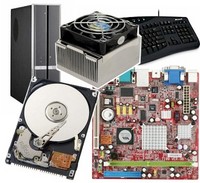Auto Manufacturers Should Take Cue from Computer Industry
Special to The Auto Channel
Seeking Alpha
Opinion By Syed Rizvi
Yesterday we learned that Toyota (TM) and Honda (HMC), who were once the pride of the auto industry, have succumbed to market forces and have joined their US counterparts in asking the government for money. Anyone that has been following the auto bailout story cannot help but feel overwhelmed by the litany of problems affecting the industry – exorbitant salaries, bloated union contracts, excessive dealer networks, lack of fuel-efficient cars, the credit crisis, health-care costs and more.
Since last month's congressional testimony, the "tone-deaf" auto executives, who flew to D.C in private jets requesting a $34B taxpayer bailout, have not offered a serious recovery plan for the industry. Meanwhile, oil has fallen from $147/barrel to $40/barrel, and is projected to fall further in the coming months. Is selling more fuel-efficient cars when oil is only $40/barrel the road to recovery? Will cutting health benefits really improve productivity? What if these aren’t the real problems but symptoms of the problem?
I believe the fundamental problem with the auto manufacturers is that their business model is obsolete. The auto manufacturers should be reorganized into separate companies specializing in manufacturing different components and systems, much in the same way computer manufacturers are organized. Dell (DELL), HP (HPQ), and IBM (IBM) (i.e. the big three) all utilize the same basic x86 processor (i.e. the engine) supplied by Intel (INTC) or AMD (AMD), a graphics card from Nvidia (NVDA) or ATI, a hard drive from Samsung or Seagate, all running an operating system from Microsoft (MSFT) or Linux. The result: satisfied customers, falling prices ever since computers were invented, and no one has ever needed a government bailout.
A computer manufacturer, using components from various suppliers, can design and assemble a performance-driven desktop for multimedia users or an energy-efficient laptop for mobile users. How does that compare to GM (GM), Chrysler, and Ford (F)? Is each car manufacturer making their own proprietary engines the most productive thing? I believe we can eliminate the redundancies, inefficiencies, and over-capacity in the industry by breaking up the giants into specialized companies. Specialization will also lead to higher quality because each manufacturer will focus on his or her core competences and ramp up or down production as the economy dictates.
Additionally, the computer manufacturing industry in its short history has managed to create standardized interfaces on components to allow suppliers to compete for the best design. Whether you prefer the Dell Monitor that came with your computer or the latest 24” Samsung widescreen, they both use the same VGA connector. How does that compare to the century old auto industry? Can you swap your old engine for the latest fuel-efficient engine through a standard port? How about upgrading the cloth seats to leather seats through a USB-like "plug and play" port. I believe standardized interfaces will lower overall costs and speed up innovation by creating a more efficient market for suppliers. Standardization may even create an environment where car prices fall like computer prices.
Above all, breaking up the industry giants would eliminate the problem of “too big to fail.” We have an opportunity to change an industry that steadfastly refuses to change itself. In exchange for money, the US taxpayers (i.e. the largest shareholder) should demand a full restructuring of the auto industry so that it is innovative, competitive, and no longer “too big to fail and too inefficient to succeed.”
P.S. Since we are discussing inefficiencies in the auto industry, is having 300 cars parked on the side of the road the best way to sell cars?



